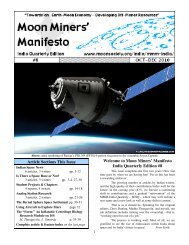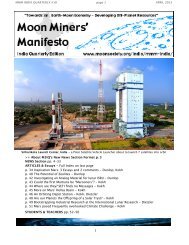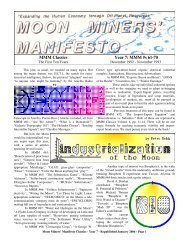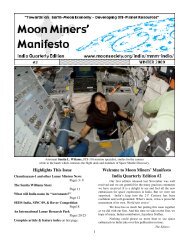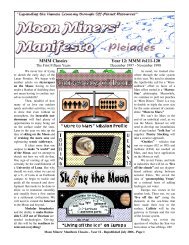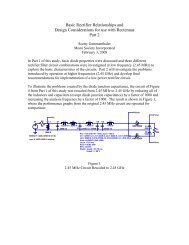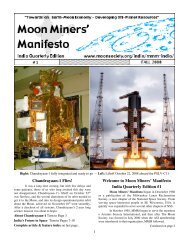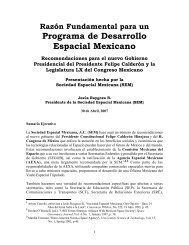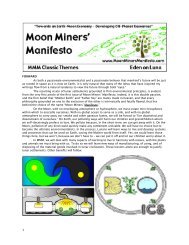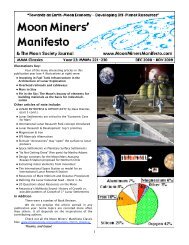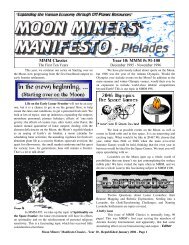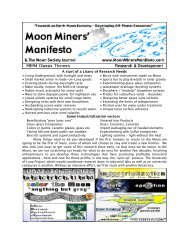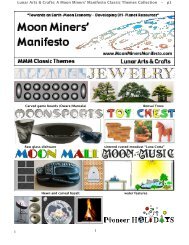Space Transportation - mmmt_transportation.pdf - Moon Society
Space Transportation - mmmt_transportation.pdf - Moon Society
Space Transportation - mmmt_transportation.pdf - Moon Society
You also want an ePaper? Increase the reach of your titles
YUMPU automatically turns print PDFs into web optimized ePapers that Google loves.
system. So is the Earth-<strong>Moon</strong> L1 Lagrange point and other lunar orbits. Anything delivered that far that could be used,<br />
reused, restructured, or cannibalized on the <strong>Moon</strong> will be far cheaper to deliver than an equivalent item all the way<br />
from Earth.<br />
The Lunar side of the Block & Tackle<br />
I remember Gordon Woodcock’s paper which sought to prove that lunar oxygen used to refuel <strong>Moon</strong>-bound<br />
cargo ships, could only reduce the cost of shipping to the <strong>Moon</strong>, but not make it profitable. Duh! What’s wrong with<br />
reducing costs? Lunar oxygen, which is abundant beyond exhaustion, can be shipped to L! and to LEO with every<br />
returning vehicle, to partially refuel each next <strong>Moon</strong>-bound craft. LOX is thus another pulley in the system. As to LH2,<br />
which is not in large supply on the <strong>Moon</strong>, we oppose shipping that off-<strong>Moon</strong> as fuel, or even for using on the <strong>Moon</strong> as<br />
fuel, except for fuel cells in which hydrogen can be recovered. Any shipment of hydrogen off the <strong>Moon</strong> limits the size<br />
to which lunar settlements and biospheres can grow. In that perspective, such shipment and usage becomes<br />
treasonable against the Lunan Frontier.<br />
Lunar Exports<br />
Many people point out that the <strong>Moon</strong> has nothing of value “on Earth” except perhaps Helium-3, and maybe<br />
platinum (I am very dubious of this latter idea.) What these people are failing to understand is that the logical export<br />
partner of the <strong>Moon</strong>, is not Earth, but LEO. Anything that can be made on the <strong>Moon</strong> to fit service needs in LEO can be<br />
shipped to LEO at a 20:1 fuel cost advantage over shipment of equivalent goods up from Earth’s surface. Of course,<br />
that statement does not factor in the need to amortize the costs of developing lunar industries needed to export such<br />
items. That does not change the argument, however.<br />
Items made of concrete, cast basalt, glass, alloys of steel, aluminum, magnesium, and titanium are candidates.<br />
Yes, there will be some specialty materials that lunar industries won’t soon be able to match. But in designing LEO<br />
installations - space stations, laboratories, factories, tourist facilities, whatever, if the design team tweaks the design<br />
to use lunar products, the cost savings will be considerable. Even dehydrated food, over 50% lunar oxygen by weight,<br />
can be shipped more cheaply to LEO than from Earth! The point is, that all these export products will help defray the<br />
cost of shipping things in LEO the rest of the way to the <strong>Moon</strong>. Another Pulley!<br />
Not to forget GEO<br />
GEO -- Geostationary Earth Orbit -- is long overdue for wholesale restructuring of the way the limited and<br />
invaluable slots along this orbit are assigned and utilized. With large platforms supplying power and station keeping,<br />
serviced by robotic tugs, many communications and other GEO satellites can share the same orbital slot, taken to the<br />
platform by the tug, and “plugged in.” GEO is almost saturated in our present “hunter-gatherer” level of allotting<br />
space. How will products from the <strong>Moon</strong> help?<br />
We already understand that lunar materials can bring down the cost of solar power satellites and relays in GEO<br />
by substantial proportions. [See last month’s MMM proposal for a World Wide Orbital Grid.] These same materials can<br />
help build new and larger platforms for communications and other uses. And the tugs needed will be of use as well in<br />
LEO in maximizing reuse and salvage of items in orbit, including gathering them for transshipment to the <strong>Moon</strong>. GEO<br />
platforms, power systems and tugs -- another Pulley”<br />
“Mechanical” Cost Advantages<br />
Any estimate of what it will cost to open the Lunar Frontier, that neglects the opportunities to ship to the<br />
<strong>Moon</strong> anything shipped to LEO, GEO, or other points in between and no longer needed at those points, or which<br />
neglects to credit exports from the <strong>Moon</strong> to LEO, GEO, or other points between will necessarily be fantastically<br />
outlandish.<br />
At the same time, we are not saying that opening the Lunar Frontier will quite pay for itself in the near future.<br />
That said, we are confident it will do so much more quickly than most authorities now estimate. Those less optimistic<br />
predictions are a natural, given the human tendency to be too optimistic in predicting the near-term future and far too<br />
pessimistic in predicting the long-term future.<br />
I was asked recently to outline “The Ten Steps Needed to Create an Earth-<strong>Moon</strong> Economy.” I dislike pre-set<br />
outlines. Whether it is five steps or fifty is uncertain. But this set of articles on “Thinking outside the Mass-Fraction<br />
Box” are my first installment towards an answer to that request. In other words, we are not going to succeed in setting<br />
up an Earth-<strong>Moon</strong> economy without paying attention to “the pulley points” along the way.<br />
LEO & GEO can only be fully developed using the significant cost advantage of Lunar materials<br />
and exports.<br />
The <strong>Moon</strong> cannot be fully developed without access to materials and items shipped to LEO which<br />
when they are of no further use there, are then transshipped to the <strong>Moon</strong>.<br />
The first Step: a refueling station in LEO<br />
At the 2007 International <strong>Space</strong> Development Conference in Dallas over the Memorial Day Weekend, Dallas<br />
Bienhoff of Boeing gave a convincing presentation that simply by refueling <strong>Moon</strong>-bound craft in LEO, we could deliver<br />
60% more goods for the money. Please view the three video segments produced by the <strong>Moon</strong> <strong>Society</strong> in which Bienhoff<br />
explains his thesis.<br />
http://link.brightcove.com/services/link/bcpid537086541/bclid537026504/bctid1171893807<br />
75



